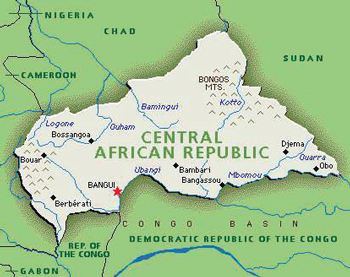GINNEWS

(GIN) – Since a coup d’etat and an extremely bloody aftermath, not much has improved in the Central African Republic and that suits the black market diamond merchants just fine. With news cameras turned away, their trade in “conflict diamonds” is proceeding at a gallop, despite a global ban.
The diamond-trading ban was imposed by the Kimberley Process, a global gem-verification group formed to halt the outflow of precious stones from conflict zones. The Central African Republic is the only country among 22 diamond producers to be covered by a ban.
The ban went into effect in May 2013, two months after President Francois Bozize was overthrown by mainly Muslim militias known as Seleka. In mid-2013, groups calling themselves the anti-balaka rose up to fight the Seleka. The anti-balaka, who harbor hatred against Muslims, initially committed large-scale reprisal attacks against Muslim civilians and later against others.
A transitional government was installed, but attacks on civilians remain alarming and widespread. Hundreds of Muslims are trapped in enclaves in the Western part of the country, fearing reprisals from the anti-Muslim militia. UN officials called it “ethnic cleansing” but stopped short of saying “genocide.”
Even before the ban, an unofficial market for gems in the Central African Republic was raking in millions. High taxes on diamonds–12 percent compared with 3.25 percent in neighboring Democratic Republic of Congo–led to about 30 percent of the sparkling stones being smuggled to Cameroon or Sudan’s Darfur region, according to the International Peace Information Service, or IPIS, an Antwerp, Belgium-based research group.
A UN panel of experts on the Central African Republic has confirmed that the illegal diamond trade is alive and well. Since the ban was introduced, at least 140,000 carats of diamonds valued at $24 million have been smuggled out of the country, said Aurelien Llorca, coordinator of the UN panel.
With the earnings from conflict diamond, the militias buy weapons, pay soldiers, enrich rebel leaders and keep ordinary citizens in fear, in refugee camps, or separated from their families. In and around the city of Bambari and in other regions, attacks against civilians are reported almost daily. A ceasefire between the parties to the conflict signed in Brazzaville, Republic of Congo, in July 2014, has been largely ignored.
The Central African Republic once ranked as the world’s 10th-biggest diamond producer by value and its profits have funded successive military regimes since the country gained independence from France in 1960.
The UN Food and Agricultural Organization recently issued an urgent appeal to provide farmers with seeds for the upcoming planting season. Some 1.5 million people are food insecure and the number is likely to rise without immediate support, they said.












